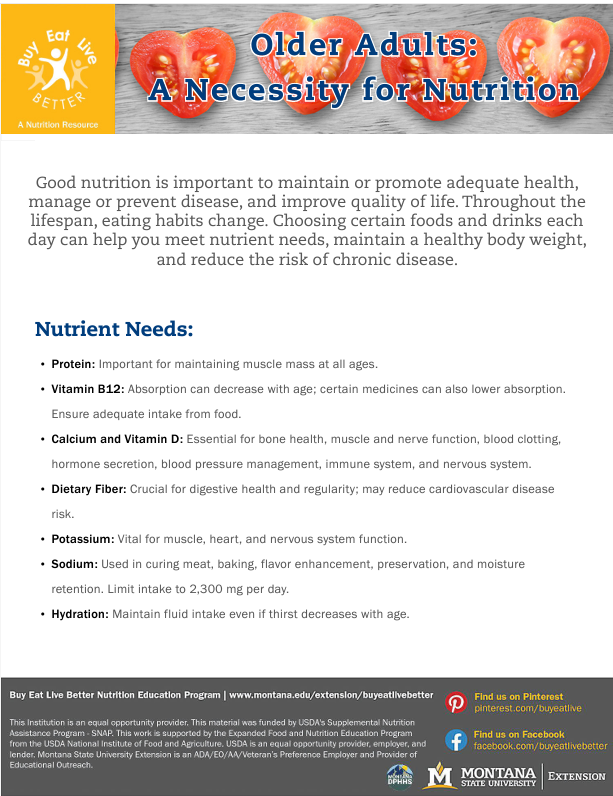Nutrient Needs for Older Adults
Good nutrition is important to maintain or promote adequate health, manage or prevent disease, and improve quality of life. Throughout the lifespan, eating habits change. Choosing certain foods and drinks each day can help you meet nutrient needs, maintain a healthy body weight, and reduce the risk of chronic disease.
Nutrient Needs:
Important for maintaining muscle mass at all ages.
Absorption can decrease with age; certain medicines can also lower absorption. Ensure adequate intake from food.
Essential for bone health, muscle and nerve function, blood clotting,
hormone secretion, blood pressure management, immune system, and nervous system.
Crucial for digestive health and regularity; may reduce cardiovascular disease
risk.
Vital for muscle, heart, and nervous system function.
Used in curing meat, baking, flavor enhancement, preservation, and moisture
retention. Limit intake to 2,300 mg per day.
Maintain fluid intake even if thirst decreases with age.
Tips to Meet Nutrient Needs:
- Protein and Vitamin B12: Eat seafood, lean
meats, dairy or fortified plant-based
alternatives, beans, peas, and lentils. Canned
seafood like salmon, tuna, or crab are
convenient options. - Calcium and Vitamin D: Include low-fat or
fat-free dairy products or fortified alternatives
daily. - Fruits and Vegetables: Include with meals and
snacks. Frozen and low-sodium canned options
are easy and nutritious. - Fluid Intake: Drink water frequently. Other good
options include low-fat or fat-free milk, milk
alternatives, 100% juice, and beverages with
limited or no added sugars or salt. Aim for at
least 64 oz of fluids daily.
- MyPlate Guide: Follow the MyPlate diagram to
include all five food groups and meet nutrient
needs. - Food Safety: Prevent foodborne illness by
keeping surfaces and hands clean, separating
raw and cooked foods, cooking to proper
temperatures, and chilling cold foods. - Dietary Supplements: Consult with a healthcare
provider before taking supplements to ensure
they meet your needs
- Sodium Reduction: Cook at home more often;
use Nutrition Facts labels to choose lower
sodium options; flavor foods with herbs and
spices instead of salt. - Added Sugars: Major sources are sugary drinks,
desserts, sweet snacks, sweetened coffee/tea,
and candy. Limit intake as these provide little
nutritional value. - Saturated Fats: Opt for low-fat dairy, lean
meats, and healthy oils like olive oil.
Unsaturated fats are healthier options found in
olive oil, salmon, tuna, flaxseed, walnuts, chia
seeds, olives, and avocado.


 You may require
You may require